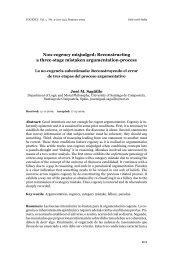Cogency v2 n2
Cogency v2 n2
Cogency v2 n2
You also want an ePaper? Increase the reach of your titles
YUMPU automatically turns print PDFs into web optimized ePapers that Google loves.
COGENCY Vol. 2, N0. 2, Spring 2010<br />
ever before. Rather than being an occasional device, questions are a staple<br />
of the text’s literary style. As in the Blue and Brown Books, Wittgenstein<br />
introduces other voices that are distinct but generally unidentified. However,<br />
sometimes there appear to be several different voices in a dialogue at<br />
once, turning it into a conversation. Most intriguing, however, is the fact<br />
that Wittgenstein goes out of his way to blur the identities and standpoints<br />
of his interlocutors in these multi-voice discussions. The editorial changes<br />
from earlier versions provide unmistakable evidence that these are deliberate<br />
modifications for a purpose. Were it not anachronistic, it would be tempting<br />
to read these as conscious attempts at Austinian perlocutionary acts or<br />
Gricean implicatures; instead, it seems more advisable to interpret them in<br />
something like Kierkegaardian terms (and we know that Kierkegaard is one<br />
of the select group of philosophers that Wittgenstein read and appreciated),<br />
and say that Wittgenstein was engaging in his own version of “indirect” communication:<br />
an attempt to communicate something to the reader by saying<br />
things which have a certain kind of effect, rather than just telling things to<br />
the reader.<br />
Wittgenstein’s heavy reliance on questions in the Investigations is justified<br />
by his goal: helping his readers free themselves from their own linguistic-conceptual<br />
confusion. Unlike the Socratic Method, which is a pedagogical<br />
tactic designed to elicit knowledge from its target, Wittgenstein’s rhetoric<br />
is a therapeutic strategy for bringing about a different sort of cognitive<br />
change in his readers. When Socrates asks questions, they are directed at<br />
his interlocutor; the questions in the Investigations are directed at<br />
Wittgenstein himself – but it is not always Wittgenstein who is asking them,<br />
and that makes all the difference. The ambiguity of not knowing whose voice<br />
is asking a question may be unsettling to the reader, but it is a large part of<br />
what makes them effective. A question without a speaker seems to hang in<br />
midair, without the mooring provided by an agent with an agenda or by the<br />
context of a standpoint. When it is unclear who is asking it, a question has<br />
to be taken on its own terms rather than as a move in a larger scheme of<br />
things. A question without an identifiable speaker is more likely to be taken<br />
as the reader’s own question, since it is less likely to be read as merely rhetorical,<br />
as part of the defense of some position, or as an attack on some<br />
other position. When the question is part of an inconclusive, multi-party<br />
argument, all of the above points are exacerbated!<br />
32








